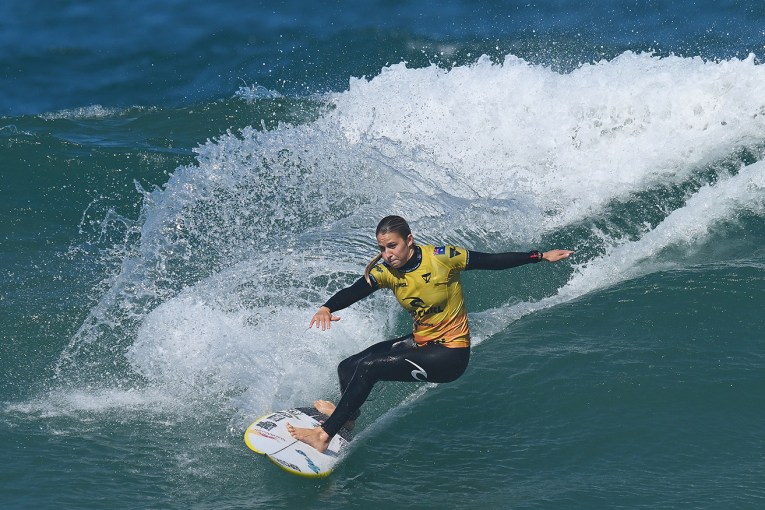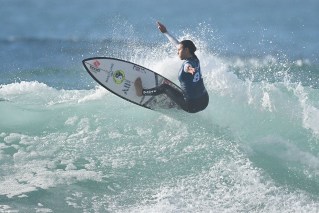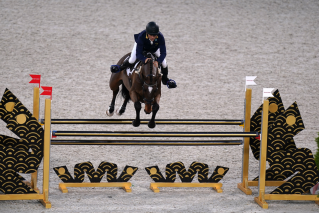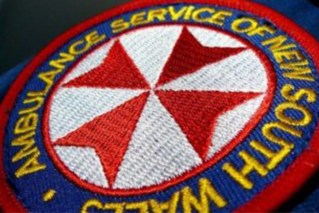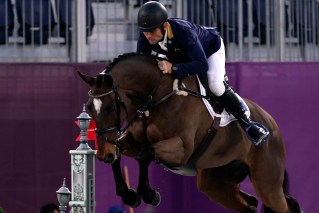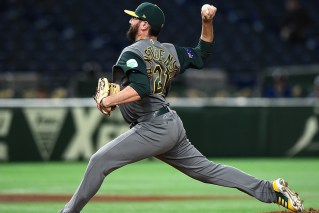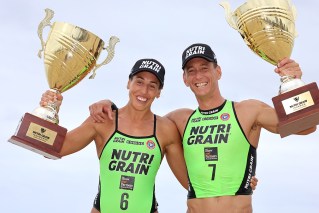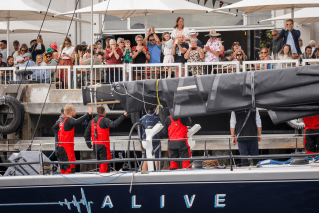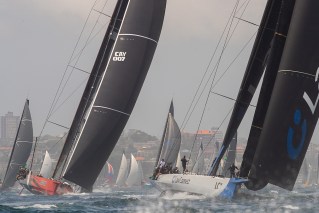Sochi sign off: Russia has last laugh, on and off the ice

Vladimir Putin and new chum Alexander Zubkov. Picture: Getty
Russia won two of the three gold medals up for grabs on the final day of competition at Sochi, capping a triumphant Winter Olympics for the host nation.
The Russians finished on top of the table for the first time since 1994, with 13 gold medals and 33 overall. Next best was Norway with 11 golds, while Canada won 10, its Games capped by a 3-0 win over Sweden in the ice hockey final.
There was no shortage of Russian politicians to exploit the victory in the four-man bobsleigh in which the host nation won from Latvia and the United States. The Australian team finished 22nd.
Alexander Zubkov, a member of the winning bobsleigh team, was strategically placed next to President Vladimir Putin at the closing ceremony.

Prime Minister Dmitry Medvedev at the bobsleigh. Picture: Getty
Prime Minister Dmitry Medvedev also attended the bobsleigh final in distinctive reflector sunglasses.
In the men’s 50 km cross country skiing event, Russia took the trifecta, with Alexander Legkov winning gold from compatriots Maxim Vylegzhanin and Ilia Chernousov.
The Russians also showed the capacity to laugh at themselves, with ice dancers at the closing ceremony at one stage forming four – instead of five – Olympic rings, a self-deprecating nod to the technical problem that marred the opening ceremony.
Australia came in at 24th on the table with two silvers – David Morris in the aerial skiing and Torah Bright in the snowboard half-pipe – and one bronze, Lydia Lassila in the women’s aerials. Morris carried the flag for Australia at the closing ceremony.
Australia’s campaign was plagued by a row over funding, although the team’s chief said this gave Australians the wrong impression of a national team divided.
The medal tally was down on expectations after a 50 per cent increase in team size, with chef de mission Ian Chesterman admitting that the focus had at times gone off sport.
Matters came to a head when snowboarder Belle Brockhoff’s father sent an explosive email on the eve of gold medal favourite Alex Chumpy Pullin’s snowboard cross event.

David Morris at the closing ceremony. Picture: Getty
It focussed on what he perceived as funding anomalies in the team. He later apologised for its timing.
Two-time world champion Pullin crashed out in the quarter-finals. “I don’t think any man is an island,” said Chesterman of Pullin on Sunday.
“There were a lot of things going through Chumpy Pullin’s mind on the morning of his race. It was already delayed by one day and I’m sure that (criticism) wasn’t helpful either. It certainly doesn’t help to have criticism from the outside launched on the eve of competition.”
He explained the issue went deeper than Pullin, who was in the crosshairs because of his funding allotment which was in the vicinity of $500,000 over four years.
“I think some of the distractions across the Games have been very unfortunate for us as a team administration and I think that it’s unfortunate that the Australian public back home get the sense that there’s a disunity in the team because there hasn’t been,” he said.
“It has been a fantastic team that I have had the pleasure to lead.”
While Pullin’s funding dwarfed what other members of the snowboard team received, Chesterman denied a decision late in the Games to announce proposed scholarships for two other riders was simply a response to criticisms. He said it came as part of a new funding cycle and because of late improvement by the snowboarders involved.
Chesterman said the Australian team’s performance should be reviewed as a success despite falling short of targets of a top-15 nations finish and a suggested four to five medals.
“Did we fail? No,” he said. “Three medals and a host of top five, eight and sixteen results is still a remarkable achievement for a developing winter sport country.”
Chesterman said there was the nucleus of a successful team for Korea in four years’ time. He envisaged a similar team size of around 60 for those Games in Pyeongchang.
Of high importance, he added, was getting a water jump facility built on the NSW north coast, to ensure strong aerials, moguls and slopestyle programs.

Russia’s winning bobsleigh team gets off to a lightning start. Picture: Getty

1-2-3: Russia’s dominant cross country team. Picture: Getty

Canadian ice hockey players hail their supremacy . Picture: Getty
The final medal table (Gold, silver, bronze, total) 1-Russia 13-11-9 (33) 2-Norway 11-5-10 (26) 3-Canada 10-10-5 (25) 4-United States 9-7-12 (28) 5-Netherlands 8-7-9 (24) 6-Germany 8-6-5 (19) 7-Switzerland 6-3-2 (11) 8-Belarus 5-0-1 (6) 9-Austria 4-8-5 (17) 10-France 4-4-7 (15) 24–AUSTRALIA 0-2-1 (3)
